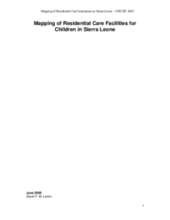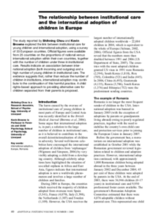Displaying 1331 - 1340 of 1465
Examines the capacity of childcare institutions and the monitoring and reintegration meausures necessary to ensure child safety in such.
Mapping of existing facilities caring for children in residential capacity for use in developing child protection standards
In this meta-analysis of 75 studies on more than 3,888 children in 19 different countries, the intellectual development of children living in children's homes (orphanages) was compared with that of children living with their (foster) families.
This report written for UNICEF identifies the key elements for a strategy to take forward the Government of Ukraine’s programme for the reform of child welfare.
Assesses the causes and realities of children living in institutions in Guatemala with recommendations for systemic reform.
This document includes the Minimum Standards on Alternative Care for Children set out by the Government of Cambodia, including both the Minimum Standards for Residential Care for Children and the Minimum Standards on Alternative Care for Children in the Community.
Explores causal relationship between increased international adoption and increase in institutional care of children in Europe.
These standards were drafted as part of a reform initiative programme in Ghana to ensure that institutional care is used as a last resort
On 13 February 2008 Prime Minister Kevin Rudd made a formal apology to Australia’s Indigenous peoples, particularly to the Stolen Generations whose lives had been blighted by past government policies of forced child removal and Indigenous assimilation.
The study reported by Shihning Chou and Kevin Browne explored the link between institutional care for young children and international adoption, using a survey of 33 European countries. The evidence suggests that, rather than reduce the number of children in institutions, international adoption may contribute to the continuation of this harmful practice. A child rights-based approach to providing alternative care for children separated from their parents is proposed.







